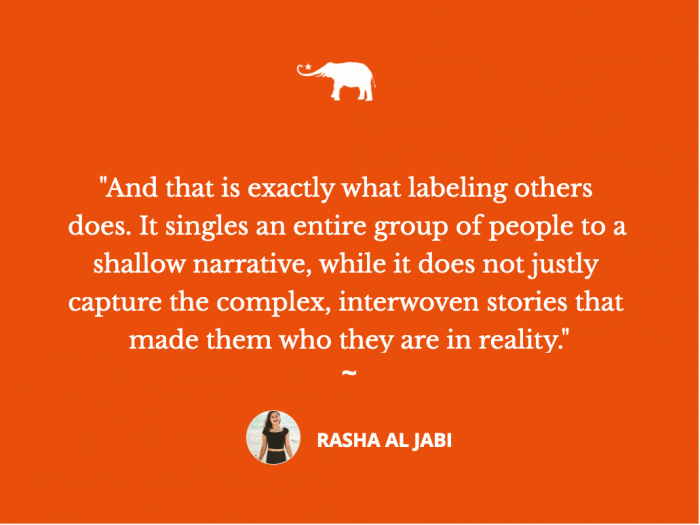~
For the greater majority of my life, my identity has been defined by different labels.
Some were chosen, others were inherited, while most were socially attached based on who others believed I was.
I recently edited a piece on Elephant Journal that explains the dangerous aspects of labeling and how, even in this digital age and overflow of information, the world has never been more polarized, whether politically, socially, racially, or even based on gender identity.
The first time I realized I am a separate being, which some might refer to as the ego, I naively believed that we were all the same. But, as we all now know, this has never been the story.
As a person who identifies with multiple identities, multiple backgrounds, multiple belongings, and yes, even multiple spiritual definitions, I was able to see the world in different colors that encompass all shades of grey. However, where I grew up, most people’s views were much more simplistic.
I believe my first clash with being labeled was in second grade. A student had asked me where I was from, and when I explained where my dad’s hometown was, she laughed and said, “But you look more Chinese,” which isn’t even an accurate description of my other belonging.
This tendency to assume where people are from based on their skin color or certain aspects of their facial or bodily features has continued all throughout my life. It shaped the greater narratives of how I saw myself. It defined who I was and how I felt about myself and the world. In most cases, it became one of the major contributors to my complex trauma.
Many literature studies define trauma as a kind of stuck energy that never got released from our subconscious mind after the traumatic event has passed, so it traps its stagnation in our bodies to replay the stories we have once experienced as hopeless, helpless humans who are incapable of defending ourselves. And, if we’re being honest for a moment, by this definition, we realize that trauma is more pervasive in our culture than medical statistics can ever capture.
If anything, according to the Diagnostic and Statistical Manual of Mental Disorders (DSM-5), racism isn’t even a criterion that qualifies for complex trauma, contrary to what many progressive mental health advocates and recent researchers have actively shown.
In the Middle East, where I grew up and spent the last 31 years of my life, I was seen as the “Asian,” which was often associated with labels like “cheap labor” or “prostitution”—or both. Unwillingly, I was the subject of both of those labels.
I remember an incident, where once, a young man had shamelessly asked me, “How much I charged for a night,” with the most obnoxious smirk I have seen on his face. But at the time, I got so accustomed to hearing these comments that the middle finger has automatically become my knee-jerk reaction to every sexual remark I would hear based on my identity alone.
The sad reality is, this habit was not exclusive to my time in the Middle East. It also perpetuated in Asia—Thailand, Malaysia, and India whenever I would occasionally go for one of my backpacking trips.
One of my former bosses once told me a story about how much he hated his stay in Bangkok because it opened his eyes to the sex exploitation by middle-aged men who would accept sexual advantages from women as young as their own granddaughters. I remember his reaction when I told him I was not spared from those offers based on the assumption that I, too, was another hopeless damsel who was looking for salvation in the arms of a white-privileged man.
Beyond my skin color and cheeky eyes that gave some clues to parts of my identity, it did not matter that I was someone’s daughter, friend, or, maybe even, girlfriend. It did not matter whether I was educated or not, that I spoke multiple languages, read books and research literature, that I occasionally wrote, what my favorite color or dish was, that I would laugh so hard when I got nervous, that I broke many cultural taboos around what Middle-Eastern women—or really any woman— shouldn’t and couldn’t do, or that I wanted to be self-reliant and walked that path by traveling to multiple places on my own.
It did not even matter that I often dissociated as a result of those harsh stereotypes that seeped into every fiber of my bones or that I could not escape or eradicate them.
All that mattered was how people saw me based on their own projection of what I could be, along with the stereotypes that are often attached to people who looked like me. And that is exactly what labeling others does. It reduces an entire group of people to a shallow narrative, often a fraction of what and who they are, while it does not justly capture the complex, interwoven stories that made them who they are in reality.
In Western societies, particularly in Europe and North American, there has been a great wave to transcend these labels by moving toward a more non-binary approach, particularly when it comes to gender identity. Even English pronouns are now being changed in school curriculums to advocate a more neutral view on how we see people.
I believe this is a great first step to spark a conversation that has been long silenced. But my question is: are these solutions meant to dust our issues around gender identity under the rug—as we often do with so many other problems—or are we willing to have the tough conversation of questioning why we have these biases in the first place?
I believe, and I reckon that anthropologists would also agree, that the tendency to “other,” stereotype and label is a socially learned behavior. And if something is learned, it can also be unlearned. Or, as the great political and resistance leader, Nelson Mandela, once expressed:
“No one is born hating another person because of the color of his skin, or his background, or his religion. People must learn to hate, and if they can learn to hate, they can be taught to love, for love comes more naturally to the human heart than its opposite.”
Now that I live here, in a Western democratic state that is somewhat inclusive, people often ask me, “Do you still face the same stereotypes?” Well, not quite, but it isn’t absent either.
Perhaps it can still be felt in a friendly, jokingly “Your English is so great” remark, or that one time a person I was seeing told me, “You’re too liberal for a Middle-Eastern woman,” as if there is a pure, pre-defined box with clear labels and an inscription that carefully reads: Middle-Eastern females go here.
The rise of social media has brought with it so many layers of complexity, confusion, and noise that made people crave simplicity. Perhaps, this explains the widening polarization that we witness within our society, particularly within the political and social spheres. But as a somewhat hopeful person, I believe it also brought with it so many opportunities to bridge the gap between the inflictor of “othering” and the persons on the receiving end.
I first heard the term “global village” being explained in a political mass media class back in university, which was before social media even existed. And with the world turning into a global village, we do have the option of using information to widen our knowledge about the “other,” reduce our own stereotypes and better educate ourselves in areas where we are currently lacking.
I don’t believe our problem is with the lack of information; I believe it has more to do with the lack of empathy and the curiosity to lean toward others with compassion. At the same time, if we never learn to see the “others” as equal human beings, how can we grow enough empathy to believe they are worthy of happiness, love, and decent rights—as we are too?
Maybe this is a story that is too personal to me, and one that holds multiple dimensions of pain. But I believe it would be a grave mistake to take the Western democracy we all enjoy for granted. We’ve all seen the weight of those political divisions last year during the outbreak of COVID-19 in America, Britain, and many parts of Europe.
While politics is partially accountable for causing those widening divisions, at the same time, how often are we, as individuals, willing to examine our own narratives that we hold about who we think others are?
Beyond our single-angled story of every African—which isn’t even an identity but an entire, rich continent—being a criminal, or a Mexican being an illegal immigrant, or a Muslim being a fanatic, suicidal terrorist, or a white person being a self-entitled supremacist, or a queer person sexually hitting on us—the fears my old friends in the Middle East used to hold, there are rich, multifaceted stories that are waiting to be discovered.
The Nigerian author of many famous books like Americanah and We Should all be Feminists, Chimamanda Ngozi Adichie, said in her 2009 TED Talk, The Danger of a Single Story:
“Stories matter. Many stories matter. Stories have been used to dispossess and to malign, but stories can also be used to empower and to humanize. Stories can break the dignity of a people, but stories can also repair that broken dignity.”
There’s so much beauty that can be found in diversity if only we’re willing to open our hearts to what others have to say. If we want to build a different future and eradicate the political and social tension we see through our media, it really matters that we do.
This beauty was captured in the poignant words of the Persian, Sufi Poet, Hafiz:
“You carry in your soul every ingredient necessary to turn your existence into joy. All you have to do is to mix those ingredients.”

 Share on bsky
Share on bsky





Read 8 comments and reply